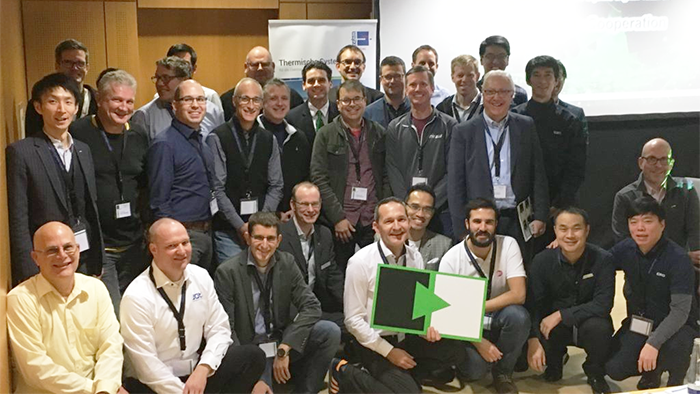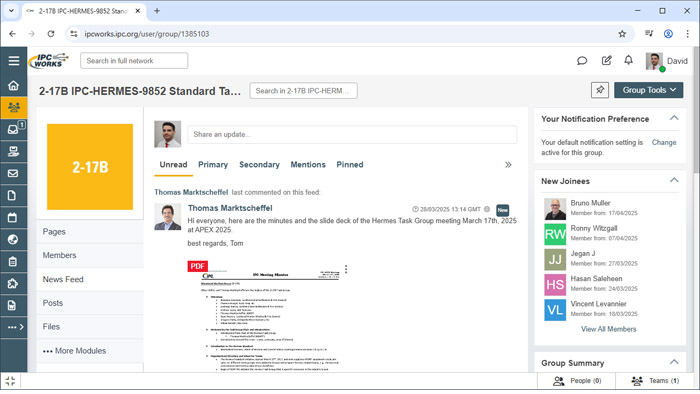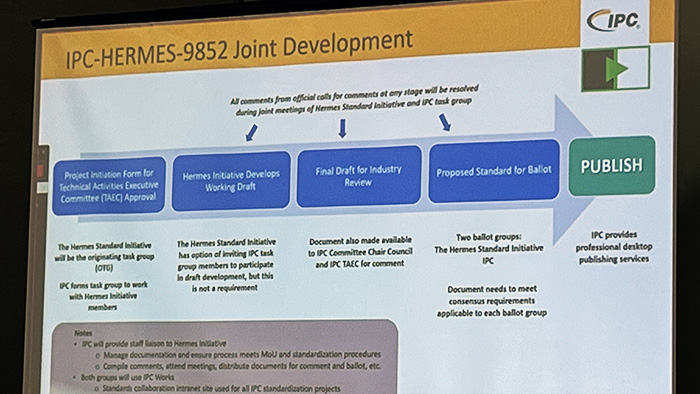The Hermes Standard 1.7 - Can we cut the cake?
If you are the sort of person who sits something out and joins the 'party' late waiting for everything to be perfect, you may have wondered what has happened to the Hermes Standard? That is something I have been asked at many trade shows.
The Hermes Standard (IPC-HERMES-9852) is a replacement of SMEMA (IPC-SMEMA-9851) using Network Sockets and XML Messages rather than creating Signals by opening and closing dedicated circuits.
On writing this blog in April 2025 you may have checked the Hermes Standard website and seen the last News article was for Productronica 2019. You may therefore conclude the Hermes Standard has stalled. Well fear not, we now serve customers in 26 countries who, step by step, are rolling out the Hermes Standard on their production lines using our SMEMA Hermes Adaptors to retrofit Hermes onto SMEMA equipment. That's just us and there are many other solutions and many other suppliers.
With the 6 years of radio silence, you still may have the question if the Hermes Standard has released its final version or as previous chairman Thomas Bliem once said, are we ready to 'cut the cake' and celebrate the end?

An Awkward Start
When we joined the Hermes Standard committee, as we are today, we were not an equipment supplier. The Standard is for, and beneficial to, the equipment suppliers. The end users benefit from the functionality that is enabled by knowing PCB Board parameters for Automatic or Copilot product changeover and Interlocking the production line for manufacturing traceability.
For this reason the committee was designed to only welcome in equipment suppliers.
After the second try, we were welcomed in my stealth because of our enabling hardware Adaptors, but we still wanted to remain as an observing passenger and really haven't benefited from being inside the 'club' in regards to any additional information.
There was always a desire to welcome in other groups such as MES software companies who may use the Supervisory Channel messages at a later date.

I feel I need to tell you that detail because I often question myself of why I haven't got involved more and sorted the challenges I saw. However today a large chunk of my week is taken up with project management of Hermes related deployments and supporting customers. That wasn't the case when we just joined the committee many years ago.
A Collaboration Experiment
It's very rare for equipment suppliers to collaborate when a Customer isn’t involved. Normally customers provide the glue of getting things done. It’s a question I’m often asked when I have contacted MES Software suppliers, they ask who's your customer? I always reply, I'm exploring your product so I can be ready for one. They reply with confusion or silence.
The reason is the SMT Assembly Industry is very sales driven. Innovation is poor, and work only gets done when the customers wave their cash. It's very common for demands from the customer to be noted on the Purchase Order, meaning they will only pay when the features are delivered. I worked on a number of 'Revenue Recognition' projects at a former employer.
Software is King
The Hermes Standard differs because while the industry’s roots primarily come from a hardware culture, this is a software only collaboration. It wouldn't be the first time that the Software Engineering discipline has rejected the practices of other engineering disciplines and shown a better way. That was my hope when I joined the software Hermes committee; A bunch of Nerds who would forget who they worked for and help each other out, share their experiences and offer suggestions to challenges and solutions.
My high expectations were not met. Meetings are around twice a year, often scheduled at trade shows. Since the pandemic there have been options to listen in to these meetings but there is still a sense that some members prefer in-person meetings. The only method of communicating to the committee is via an online forum which doesn't seem to be used anymore and questions are often unanswered. To be fair to the forum it was initially created for the publications of proposals and not conversations.
By the point we come to the meetings it's often the first time members see a proposed enhancement. We normally get a small heads-up by the meeting's agenda. At the end of the meeting we have to vote. Only those at the meeting are able to vote, so if your time zone doesn't suit, then you lose your vote. This gives more weight for those that do vote.
There are working groups that I had thought were created as-needed to work on the details of any proposal’s implementation, but it seems these have morphed into a fulltime role.
IPC Works to the Rescue
Knowing that the software companies would be welcomed in at some point, and knowing the current difficulties of the governance of the standard, I continued to push to move to us all over to be formally managed by the IPC’s way of workings and its IPC Works tool.
For the first time the IPC Works tool would give us a single point of communication, from simple text messaging to document sharing. I would be able to see a list of the other members and be able to message them directly if my customers were having installation issues with their equipment.
This started to demonstrate my ignorance in the whole situation, after all there were reasons why the Hermes committee hadn't been managed by the IPC in the first place. Some suppliers don’t want to mix with the IPC, which they see contains the customers that could control them.

The IPC, which letters no longer stands for anything, is an American trade association which primarily facilitates the creation of industry standards and hosts events for the industry such as trade shows. It's an open shop; anyone or any business can participate in any of the activities the IPC conducts, normally the only transaction being a paid membership, however Hermes members would be allowed to use IPC Works for free.
The Separation
What I expected to happen next was the Hermes membership would disband, the chairman would step down and we would be able to 'Cut The Cake' in celebration we had met a milestone. We would be ready to open up this to everyone. The existing membership would be encouraged to sign up to IPC Works and a new 'A Team' would be formed, which was the equivalent of the working groups, with a new Chair and co-Chair elected in. Simple, I thought.
I have to admit, because I expected this to happen, I wasn’t paying much attention to notice another thing would occur. It was presented to us at least twice, and I even have a photo of one of the slides, but due to the factual style of the delivery, I presumed it was a done deal. Ultimately the final decision came down to a vote and I have already detailed how it doesn’t consider the whole membership, or have a threshold anything more than 50% of those voting on the day.
What actually happened was a new IPC group formed and they meet after the Hermes membership meetings. Apart from seeing proposal changes and enhancements to the Standard, they aren't invited to, or see a recording of the Hermes membership meetings.

This arrangement is only a year old so I have no idea how the communication is working and if it was causing delays or confusion. You can easily assume that if one group pushes back on anything then it would create a six-month delay at least while the other group considers their reasons.
I have considered moving to the IPC Group, however they don't conduct Online Meetings because they arrange their meetings around trade shows or other physical meetings hosted throughout the year, which for me is time consuming and costly. I'm sure if the Hermes Membership merged in, it would be the first thing we changed.
So, can we cut the cake?
The reason we are where we are, that is, a really positive position with the Standard being deployed successfully across the World, is sheer luck in my opinion. With the current governance of the standard, anything more complex or controversial would have failed by now.
It worked fine when there were a few members who were the main driver of developments, but now every version number affects a larger userbase even though all versions are backward compatible.
The Standard has a major constraint which is the messages are being consumed by the PLCs (programmable logic controllers) of board handling equipment.
Madness in my view, but this means the data payload has to stay small, therefore the standard hasn't changed that much over the years. Large datasets should use the CFX (Connected Factory Exchange). This constraint has in my view saved it from bloat and failure.

I have no knowledge of whether we can cut the cake or the future roadmap of the Standard, but reading between the lines of members' comments over the years I feel many of us believe the job is now done and we can step-up the marketing drive instead by updating the website and promoting the benefits of the Standard to the end userbase.
In my opinion we are done, we have replaced SMEMA and enhanced it with PCB Board metadata, it's time to cut the cake.
About 4IR.UK British Systems
We are a Smart Factory solutions provider for the SMT Electronics Assembly manufacturing industry. We were founded in 2016 after the support of a seed funded Business Accelerator. We create hardware Adaptors that operate in more than 20 countries that extend the life of SMEMA based manufacturing equipment by providing solutions for production monitoring and supporting data connections to the Hermes Standard and the Connected Factory Exchange CFX. We also develop Software Extensions for the Low-Code No-Code MultiPlug Edge Computing Platform. The flexibility of off-the-shelf software combined with inside industrial experience means that 4IR.UK is ideally placed to anticipate and respond to a factory's changing needs.


